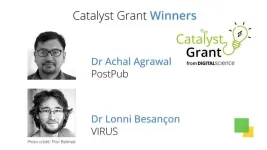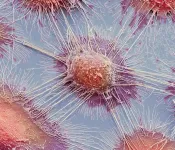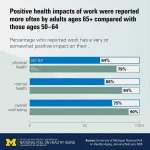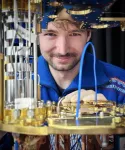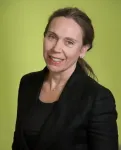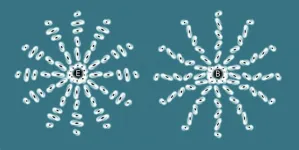(Press-News.org) Digital Science has awarded its latest Catalyst Grants to two innovative teams, supporting their technology ideas aimed at safeguarding research integrity and strengthening trust in science.
The winners will use the funding and mentorship from Digital Science to develop their ideas, both of which include enhanced dashboards – visualizations based on available data – to flag retracted or questionable research papers.
The winning applications from Digital Science’s 2024 Catalyst Grant round announced today are:
PostPub – led by Dr Achal Agrawal (Founder), with Dr Moumita Koley (Senior Research Analyst, DST-Center for Policy Research, and Research Fellow, RoRI, UK)
VIRUS (Visualization of Irregular Research Under Scrutiny) – led by Dr Lonni Besançon, with Dr Fabrice Frank
PostPub – based in India
This team aims to address a lack of awareness of research misconduct as well as a lack of accountability for those engaged in it. PostPub, which has already established its own Retraction Dashboard, will draw on Digital Science data to extend the dashboard. The dashboard will visualize gaps in the data-sharing practices of researchers across countries and journals, and journal response times when integrity issues are flagged, and will flag irregular activity. PostPub also aims to create a notification system to alert responsible parties about these irregularities, and to track actions taken, helping to improve accountability in research.
VIRUS – based in Sweden
This team is developing a real-time visualization system and dashboard intended to be used by scientific “sleuths”, as well as research integrity teams from publishers, editorial teams in journals, and universities. The system will keep records of papers that have been flagged as questionable, as well as their impact on several scholarly measures – such as citations, altmetrics, and policy attention – to better understand the potentially harmful impact these papers could have. The team aims to move away from smaller, curated subsets of papers to using much wider databases, such as Digital Science’s own Dimensions, the world’s most complete database of linked research information.
PostPub’s Dr Achal Agrawal said: “We are honored to receive the Catalyst Grant from Digital Science, enabling us to take the research integrity work we have begun to the next stage of development. Through our work, we hope to incentivize researchers, universities and publishers to do the right thing and encourage greater responsibility for research integrity. In the long term, we hope our work will help in reducing research malpractices and increase transparency with respect to actions taken by various stakeholders.”
VIRUS’s Dr Lonni Besançon said: “We are both happy and honoured to receive this Catalyst Grant from Digital Science in what we hope to be a successful venture coordinated with the research and sleuthing of Forensics Scientometrics. We believe our system has a particularly important role to play in visually assessing and communicating the impact of questionable papers which are still cited or used in policy documents or clinical guidelines. We hope VIRUS will make it easier to prioritize investigations and editorial decisions and help provide a faster and more efficient decontamination of the scientific literature. Ultimately, we anticipate that this work will be the first of a long collaboration with Digital Science and its amazing team.”
Digital Science CEO Dr Daniel Hook said: “I congratulate our new winners of the Digital Science Catalyst Grant. Each of this year’s winners has approached a key issue of research integrity from an innovative angle, and focusing on practical solutions that have the potential to safeguard research and build people’s trust in science. I also want to thank Dr Leslie McIntosh, a prior Catalyst winner and VP Research Integrity at Digital Science, for working with our Catalyst team, headed by Steve Scott, to bring about this integrity-focussed Catalyst Grant. We look forward to mentoring the successful teams to make the most of the Catalyst Grant and to take their ideas to wider audiences.”
Steve Scott, Director of Portfolio Development at Digital Science, said: “We’ve been impressed by the excellence of this year’s entries in the Digital Science Catalyst Grant. Our focus this year on research integrity demonstrates our commitment to addressing some of the biggest issues facing the research ecosystem today. The innovative solutions presented by our winning teams show great promise, and we’re excited to see where they will go from here.”
About Catalyst Grant
The Digital Science Catalyst Grant is an international initiative to support innovation in new software tools and technologies to advance research and create meaningful change.
The program supports and invests in early-stage ideas in the novel use of technology, with an award of up to £25,000 for the most promising ideas that aid research and further its impact on society.
Now in its 14th year, the Catalyst Grant is awarded to innovative individuals or startups, without the need for a complete business or development plan. Several previous Catalyst Grant winners have developed important products and solutions within Digital Science itself.
Research integrity was the focus of the Digital Science Catalyst Grant round for 2024.
About Digital Science
Digital Science is an AI-focused technology company providing innovative solutions to complex challenges faced by researchers, universities, funders, industry and publishers. We work in partnership to advance global research for the benefit of society. Through our brands – Altmetric, Dimensions, Figshare, IFI CLAIMS Patent Services, metaphacts, OntoChem, Overleaf, ReadCube, Symplectic, and Writefull – we believe when we solve problems together, we drive progress for all. Visit digital-science.com and follow Digital Science on Bluesky, on X or on LinkedIn.
Media contact
David Ellis, Press, PR & Social Manager, Digital Science: Mobile +61 447 783 023, d.ellis@digital-science.com
END
Digital Science announces Catalyst Grant winners, rewarding innovations to safeguard research integrity
2025-02-11
ELSE PRESS RELEASES FROM THIS DATE:
How cancer cells trick the immune system by altering mitochondria
2025-02-11
The immune system plays a key role in detecting and destroying cancer cells. Cancer immunotherapy works by programming immune cells to recognize and eliminate cancer cells. However, many cancers can escape immune surveillance through various mechanisms, resulting in resistance to treatment. This highlights the need to better understand the molecular processes that enable immune evasion.
The tumor microenvironment (TME)—the space surrounding a tumor—plays a critical role in interactions between cancer and immune cells. Cancer cells can reshape the TME to ...
Poll: Most U.S. workers with chronic conditions manage them at work, haven’t told employer
2025-02-11
Embargoed for release: Tuesday, February 11, 2025, 6:00 AM ET
Key points:
More than half of employees in the U.S. (58%) report having physical chronic health conditions, such as hypertension, heart disease, diabetes, and asthma, according to a new nationally representative survey.
Three-fourths of U.S. employees with chronic conditions (76%) need to manage their conditions during work hours, yet a majority (60%) have not formally disclosed their conditions to their employer.
More than one-third of U.S. employees with chronic conditions (36%) say they have skipped medical appointments or delayed getting care to avoid ...
Disruption of a single amino acid in a cellular protein makes breast cancer cells behave like stem cells
2025-02-11
UNDER STRICT EMBARGO UNTIL TUESDAY 11 FEBRUARY 2025, 11am (UK time)
Disruption of a single amino acid in a cellular protein makes breast cancer cells behave like stem cells
Peer reviewed | Observational | Cells
Changes to the intermediate filament (IF) protein, vimentin, were found to promote tumour growth by increasing cancer stemness in an oestrogen independent manner. Targeting vimentin and/or the long noncoding RNA (lncRNA) ‘XIST’ could be an effective therapeutic strategy ...
As more Americans work later in life, poll shows positive health impacts, especially for those over 65
2025-02-11
Having a job – whether it’s working for someone else or being their own boss – gives older Americans more than just a way to earn money or get health insurance, a new poll finds.
More than two-thirds of those who work after age 50 say that working boosts their physical health, mental health, and/or their overall wellbeing, according to a new report from the University of Michigan National Poll on Healthy Aging.
Nearly half (46%) of those who work say that having a sense of purpose is a very important ...
Is the Metaverse a new frontier for human-centric manufacturing?
2025-02-11
Is the Metaverse a new frontier for human-centric manufacturing?
The future of manufacturing is not just about machines and AI; it's about re-empowering humans, according to a new study from the University of Surrey.
The integration of advanced technologies like augmented reality (AR) and digital twins is set to redefine the workforce's role, making humans an essential part of the manufacturing equation once again.
The paper, published in Sustainability, explores the transformative potential of Metaverse technologies ...
When qubits learn the language of fiberoptics
2025-02-11
Qubits—the fundamental units of quantum information—drive entire tech sectors. Among them, superconducting qubits could be instrumental in building a large-scale quantum computer, but they rely on electrical signals and are difficult to scale. In a breakthrough, a team of physicists at the Institute of Science and Technology Austria (ISTA) has achieved a fully optical readout of superconducting qubits, pushing the technology beyond its current limitations. Their findings were now published in Nature Physics.
Following a year-long rally, ...
The prevalence of older Americans without disabilities increases substantially between 2008 and 2017
2025-02-11
Toronto, ON – A sizeable improvement was found in the prevalence of American adults aged 65 and older without disabilities -- including memory, hearing, visual, and functional disabilities or limitations in activities of daily living -- according to a new nationally representative study published online in the Archives of Gerontology and Geriatrics Plus found.
In total, 61% of older Americans reported being free from disability in 2008. The prevalence increased to 65% in 2017. While this may seem like a small increase, had the prevalence of individuals without disabilities remained ...
New study reveals hidden manic symptoms in one-fourth of schizophrenia patients
2025-02-11
THESSALONIKI, Greece, 11 February 2025 - In a notable Genomic Press research report, researchers at the Aristotle University of Thessaloniki have uncovered a significant presence of manic symptoms in patients with schizophrenia spectrum disorders (SSDs), offering valuable insights that could reshape treatment approaches.
The rigorous peer-reviewed study, published in Brain Medicine, examined 75 stable outpatients with SSDs, revealing that more than one in four patients (26.7%) exhibited distinct manic symptoms, a finding that ...
Does the universe behave the same way everywhere? Gravitational lenses could help us find out
2025-02-11
“The cosmological principle is like an ultimate kind of statement of humility,” explains James Adam, astrophysicist at the University of the Western Cape, Cape Town, South Africa, and lead author of the new paper. According to the Cosmological Principle, not only are we not at the center of the Universe, but a true center does not exist. A further assumption, similar to but distinct and independent from homogeneity, is that the Universe is also isotropic, meaning it has no preferred directions. These assumptions underlie the Standard Model of Cosmology, the theoretical ...
Majority support moderation on social media platforms
2025-02-11
Most people want harmful social media content such as physical threats and defamation to be restricted. This also applies in the USA where several social media platforms have recently modified their policies in favor of unrestricted free speech. However, the majority of users believe that intolerance and hate have become unavoidable on social media. This was revealed in a large-scale survey conducted by the Technical University of Munich (TUM) and the University of Oxford in 10 countries in Europe, America, Africa and Australia. The study also highlights differences among countries.
The global debate on whether and how social media content should ...
